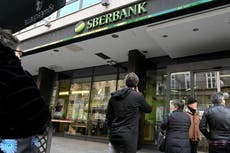Liz Truss slaps sanctions on Belarus for supporting Russian invasion of Ukraine
Lukashenko regime ‘aiding and abetting’ Moscow, says foreign secretary
Britain has slapped sanctions on Belarus in response to the eastern European country’s support for the Russian invasion of Ukraine, foreign secretary Liz Truss has announced.
The Foreign Office said the government was imposing its “first tranche” of sanctions against Belarusian military chiefs and organisations for assisting in Vladimir Putin’s aggression.
Four senior defence officials working for Alexander Lukashenko’s government and two Belarusian military enterprises have been sanctioned with immediate effect under the UK’s sanctions regime.
“The Lukashenko regime actively aids and abets Russia’s illegal invasion and will be made to feel the economic consequences for its support for Putin,” said Ms Truss.
The foreign secretary said: “We are inflicting economic pain on Putin and those closest to him. We will not rest until Ukraine’s sovereignty and territorial integrity is restored.
She added: “There will be nowhere to hide. Nothing – and no one – is off the table.”
Belarusian state enterprises JSC 558 Aircraft Repair Plant and JSC Integral, a military semi-conductor manufacturer, have been sanctioned, the Foreign Office announced on Tuesday evening.
The four individuals hit be sanctions includes chief of the general staff Major General Victor Gulevich. The Foreign Office claims he has directed joint military exercises with Russia, and consented to the deployment of Russian troops along the border of Belarus with Ukraine.
The other sanctioned individuals are Major General Andrei Burdyko, the deputy minister of defence for logistics, Major General Sergei Simonenko, the deputy minister of defence for armament, and deputy minister of defence Major General Andrey Zhuk.
The move means the named individuals will not be able to travel to the UK and any British-based assets will be frozen.
Additional economic measures introduced by the Foreign Secretary bans UK individuals and entities from providing financial services to the Central Bank of the Russian Federation, as well as the Ministry of Finance and National Wealth Fund.
The Russian Direct Investment Fund (RDIF) – the country’s sovereign wealth fund – and its chief executive, Kirill Dmitriev, have also been sanctioned, with their assets frozen and a travel ban in place for Mr Dmitriev.
It comes as ministers were warned that sanctions against Russia need to “go even faster and further” so that a “sanction gap” with the UK’s allies does not open up.
Calls from both Labour and Conservative MPs to strengthen the sanctions regime came as MPs approved new measures against Russia over its invasion of Ukraine.
The package announced on Monday includes a full asset freeze for all Russian banks, as well as new powers to limit them from clearing payments in sterling.
Labour shadow foreign minister Stephen Doughty urged the government to do more, warning in some cases the sanctions have been “off the pace” compared with allies.
Cabinet Office minister Michael Ellis said the ban on all Russian companies from lucrative UK funding goes further than steps taken by many allies.
The government has also introduced an Economic Crime Bill, vowing to use the legislation to tackle “dirty money” and expose foreign oligarchs who launder their wealth through the UK’s property market.
The legislation aimed at setting up a new register of overseas entities requiring foreign owners of property in the UK to declare their true identity, in a move intended to ensure criminals cannot hide behind secretive webs of shell companies.
But some MPs said the government had been much too slow to sanction individuals with close ties to the Kremlin.
Labour veteran Margaret Hodge used parliamentary privilege on Tuesday to read out the names of 10 Russian oligarchs with “links to the UK” from a list of 105 who she said should be sanctioned.
Conservative MP Bob Seely called for a public inquiry “into what has gone wrong in the last 10 to 15 years because this system is becoming rotten at so many levels”.
Join our commenting forum
Join thought-provoking conversations, follow other Independent readers and see their replies
Comments


Bookmark popover
Removed from bookmarks